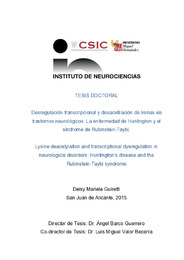Título :
Lysine deacetylation and transcriptional dysregulation in neurological disorders: Huntington's disease and the Rubinstein-Taybi syndrome |
Autor :
Guiretti, Deisy Mariela |
Tutor:
Barco Guerrero, Ángel
Valor Becerra, Luis Miguel |
Departamento:
Instituto de Neurociencias |
Fecha de publicación:
2015-09-14 |
URI :
http://hdl.handle.net/11000/3410 |
Resumen :
Lysine deacetylation and transcriptional dysregulation in neurological disorders: Huntington¿s disease and the Rubinstein-Taybi syndrome
Cognitive decline and other neurological symptoms associated with aging,
neurodegenerative diseases such as Alzheimer¿s diseases or poliglutamines (polyQ)
diseases (e.g. Huntington¿s disease (HD)) and congenital intellectual disability
disorders (e.g., Rubinstein-Taybi syndrome (RSTS)) have been associated with
reduced level of neuronal histone acetylation. Here we investigate the genome-wide
correlation of histone acetylation and gene expression defects in a HD mouse model
(HD82Q). Our analyses identified hundreds of loci that were hypoacetylated for
H3K9/14 and H4K12 in the chromatin of HD82Q) mice. Surprisingly, few genes with
altered transcript levels in mutant mice showed significant changes in these
acetylation marks and vice versa. Genes in this group were consistently affected in
different brain areas, mouse models and tissue from patients, which suggests a role
in the etiology of this pathology. Overall, our histone acetylation and gene expression
screens demonstrate that these phenomena are two early, largely independent,
manifestations of polyQ disease. Subsequently, we extended the observation of the
limited impact of polyQ pathology in global histone acetylation profiles to other animal
and cellular HD models. In the absence of bulk chromatin changes, we documented
histone deacetylation events at the transcription start sites (TSS) of relevant genes
for neuronal functioning. These local deficits can be associated with an increased
susceptibility for transcriptional dysregulation and defective trimethylation of histone
H3 at lysine 4 (H3K4me3), another covalent modification of the histone tails related
with active transcription that is also altered in HD. Overall, this study provides further
insight into the nature and extent of epigenetic dysregulation in HD pathology.
In the second part of this thesis we addressed the role of the CREB-binding
protein (CBP), a transcriptional co-activator which mutation is linked to the RSTS. To
this end, we generated and characterized a Nes-cre::CBPf/f mouse line. These mice
presents the ablation of CBP in neural-derived cells, hence, they are usefull to
determine the role of CBP in the development of the nervous system and the etiology
of the RSTS). The absence of CBP in neural-derived cells caused perinatal death
and severe neuronal growth defects in primary hippocampal cultures. Both
phenotypes were associated with a severe histone hypoacetylation. In order to
counteract the reduced histone acetylation observed in RSTS, we have designed and
generated recombinant lentiviruses (LV) that overexpress the KAT activity of CBP
specifically in neurons (KAT-LV). The KAT-LV vector efficiently reverted histone
acetylation deficits and led to a partial recovery of the dendritic tree integrity in
primary hippocampal cultures from homozygous embryos. This strategy may
represent a novel therapeutic approach not only for RSTS but also for others
neurological diseases associated with neuronal histone deacetylation like HD.
|
Palabras clave/Materias:
Neurociencias |
Área de conocimiento :
CDU: Ciencias aplicadas: Medicina: Patología. Medicina clínica. Oncología: Neurología. Neuropatología. Sistema nervioso |
Tipo de documento :
info:eu-repo/semantics/doctoralThesis |
Derechos de acceso:
info:eu-repo/semantics/openAccess |
Aparece en las colecciones:
Tesis doctorales - Ciencias de la Salud
|
 La licencia se describe como: Atribución-NonComercial-NoDerivada 4.0 Internacional.
La licencia se describe como: Atribución-NonComercial-NoDerivada 4.0 Internacional.
.png)
